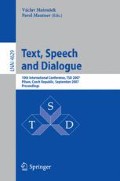Abstract
The paper discusses the benefit of a Maximum Likelihood Linear Transform (MLLT) applied on selected groups of covariance matrices. The matrices were chosen and clustered using phonetic knowledge. Results of experiments are compared with outcomes obtained for diagonal and full covariance matrices of a baseline system and also for widely used transforms based on Linear Discriminant Analysis (LDA), Heteroscedastic LDA (HLDA) and Smoothed HLDA (SHLDA).
This paper was supported by the AVCR, project no. 1QS101470516., GACR, project no. 102/05/0278 and the project of the EU 6th FP no. IST-034434.
Access this chapter
Tax calculation will be finalised at checkout
Purchases are for personal use only
Preview
Unable to display preview. Download preview PDF.
References
Psutka, J.V., Müller, L.: Comparison of various decorrelation techniques in automatic speech recognition. Jour. of Syst., Cyb. and Inf. 5(1), 27–30 (2007)
Psutka, J.V., Müller, L.: Building Robust PLP-based Acoustic Module for ASR Application. In: Proc. of the 10th SPECOM’2005, Greece, pp.761–764 (2005)
Olsen, P.A., Gopinath, R.A.: Modeling inverse covariance matrices by basis expansion. IEEE Trans. on Speech and Audio Proc. 12(1), 272–281 (2004)
Visweswariah, K., Axelrod, S., Gopinath, R.A.: Acoustic modeling with mixtures of subspace constrained exponential models. In: Proc. of the 7th Eurospeech 2003, Geneva, Switzerland, pp. 2613–2616 (2003)
Burget, L.: Combination of Speech Features Using Smoothed Heteroscedastic Linear Discriminant Analysis. In: Proc. of the 8th ICSLP 2004, Jeju, Korea, pp. 2549–2552 (2004)
Psutka, J.V.: Techniques of parameterization, decorrelation and dimension reduction in ASR systems. Thesis. Depart. of Cybernetics, Univ. of West Bohemia, Pilsen (in Czech) (2007)
Gales, M.J.F.: Semi-Tied Covariance Matrices for Hidden Markov Models. IEEE Transactions on Speech and Audio Processing 7(3), 272–281 (1999)
Author information
Authors and Affiliations
Editor information
Rights and permissions
Copyright information
© 2007 Springer-Verlag Berlin Heidelberg
About this paper
Cite this paper
Psutka, J.V. (2007). Benefit of Maximum Likelihood Linear Transform (MLLT) Used at Different Levels of Covariance Matrices Clustering in ASR Systems. In: Matoušek, V., Mautner, P. (eds) Text, Speech and Dialogue. TSD 2007. Lecture Notes in Computer Science(), vol 4629. Springer, Berlin, Heidelberg. https://doi.org/10.1007/978-3-540-74628-7_56
Download citation
DOI: https://doi.org/10.1007/978-3-540-74628-7_56
Publisher Name: Springer, Berlin, Heidelberg
Print ISBN: 978-3-540-74627-0
Online ISBN: 978-3-540-74628-7
eBook Packages: Computer ScienceComputer Science (R0)

